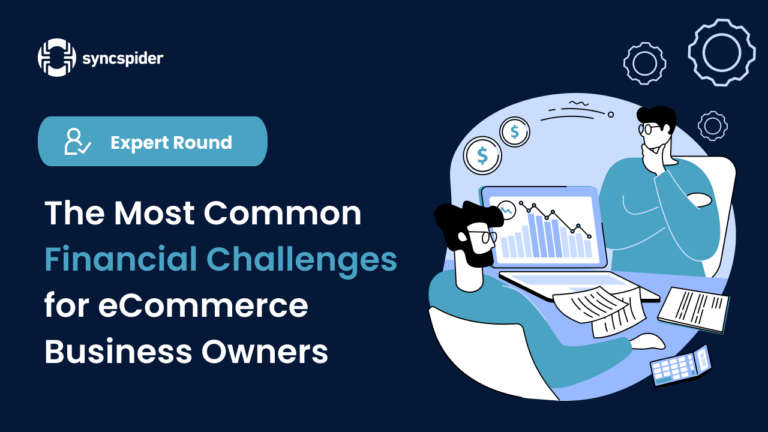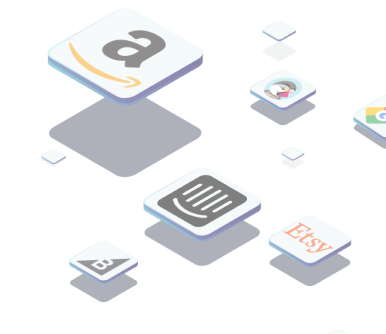AI in eCommerce? Yes or no? Can artificial intelligence (AI) benefit eCommerce? Is it a myth, or can it truly boost your business? Hmm, consider artificial intelligence as a new industrial revolution. If you lived in the 1760s, would you ignore the changes or immediately hop on a boat? And what do you think, who did better: the early adopters or the doubting Thomases?
Let’s face it; changes are all around us. And you know better. The history of automation showed us how it goes. Every time a trend in the market changes, you must hurry to keep up with it. Otherwise, you become a dinosaur (and we all know what happened to them!)
I know it can sometimes be overwhelming. So many tools, software solutions, and apps that you can use… Which one to choose? On top of that, the competitors are popping out like mushrooms, which makes everything even more challenging.
Artificial Intelligence in eCommerce: Benefits, Statistics, and Examples
How can artificial intelligence help you in your eCommerce business? Are there any stats that could back up these thoughts? And how about some examples? Yeah, all that, but first, a bit of clarification.
What is AI, and how long has it been a part of our lives?
AI is not new; it didn’t emerge yesterday! The term was coined way back in the 1950s, addressing the ability of machines to perform specific tasks that required human or animal intelligence.
So, let’s see what the timeline of artificial intelligence development looks like.
- The 1950s: Artificial intelligence emerged as a new term (The Dartmouth Conference in 1956)
- The 1960s-1970s: We were introduced to programs that could play simple games like checkers and early natural language processing systems. For example, Samuel’s Checkers Playing Program was the first AI program that could beat a human in a chess game.
- The 1980s-1990s: The business world started accepting expert systems and rule-based artificial intelligence, but progress in other AI areas needed improvement. The MYCIN expert system is probably the best example. It was developed at Stanford University to assist medical professionals in diagnosing and treating bacterial infections. It was so good that its diagnosing was at roughly the same level of competence as human specialists in blood infections and better than general practitioners. In the eCommerce industry, Amazon introduced its recommendation system, which was AI-based, in 1998.
- 2000s-present: Major shifts and progress in computing, data collection, and machine learning algorithms have led to a significant expansion in artificial intelligence usage in recent years. This includes computer vision, speech recognition, natural language processing, and the rise of deep learning and neural networks. You probably know the examples for this period, Amazon’s Alexa, Apple’s Siri, and Google Assistant… they are all AI at your service.
As you know, today, artificial intelligence is used in many applications, from self-driving cars to personalized marketing strategies. The benefits of artificial intelligence are so tangible that it’s almost impossible to imagine running an online business (b2b, b2c, or c2c) without it being implemented in at least one segment. Artificial intelligence isn’t something you should be afraid of, but something you should consider as an ally.
eCommerce AI: What Business Processes Can You Improve With AI?
According to statista.com, 87% of global business organizations believe implementing AI will provide them a competitive edge. Let’s see what business processes you can improve with AI if you’re among them.
- Recommendation system
- Sight search
- Forecasting & Planning
- Marketing
- Customer Service
- Pricing
- Sales
- Safety
- Product Assortments
- Delivery
AI Help with Personalization in eCommerce Industry
What do we use personalization for, and why is it so important? Let’s start with the fact that you need to know what your customers like and their preferences to be able to re-sell them something.
And the best personalization example is the recommendation system.
As you might have read above, Amazon’s recommendation system was one of the first implemented AI in eCommerce. It proved to be a powerful tool for boosting sales. But what is it, and how it works?
An online recommendation system uses algorithms, data analysis, and artificial intelligence (AI) to provide personalized recommendations to users.
It analyzes user behavior and preferences data and, based on that, creates personalized recommendations for products, services, or content. The whole process consists of several phases:
- Data collection – The process of collecting data on user behavior that includes what users have purchased or viewed, what items are in their shopping cart, what they have liked or disliked, and how long they have spent on a particular page.
- Data Preprocessing – The process of removing any irrelevant or duplicate data and transforming them into a format the recommendation algorithm can easily analyze.
- Recommendation Algorithm – There are several types of recommendation algorithms, such as Collaborative (recommendations based on other users with similar preferences), Content-Based (recommendations based on the characteristics of items the user has previously liked or purchased), or Hybrid Filtering (combining the two previous algorithms).
- Evaluation – The evaluation process ensures providing relevant and valuable recommendations to the users. It uses accuracy, precision, recall, and F1 score metrics.
- Deployment – Providing personalized recommendations to users in real time.
According to McKinsey, 35% of all Amazon purchases are driven by their recommendation systems.

Site Search with an AI Help
From Google to Instagram, Pinterest, and all other social media, they all use AI algorithms to improve the user experience and provide relevant content. And you know what? The same goes for eCommerce, especially if you own a multivendor marketplace.
How does that work?
It is well known that displaying search based only on the keyword is not enough anymore. This search could be more reliable since it often needs to show more relevant content. And that’s where AI comes into the scene.
AI site search uses machine learning algorithms to analyze user behavior, search patterns, and content on the website better to understand the intent behind the user’s query and provide more relevant search results.
Therefore, AI site search improves the user experience by providing more accurate and personalized search results, increasing engagement, conversions, and customer satisfaction.
AI Use & Forecasting
Forecasting was always a part of the business. Any business, including eCommerce. Now, the thing is that previously, people used methods, including statistics and expert analytics, to predict how the market would behave. But over the years and with the constant development of artificial intelligence, Artificial intelligence forecasting has become increasingly used.
The advantage of AI forecasting compared to humans is that it takes a more data-driven approach. It uses advanced algorithms to identify patterns, trends, and anomalies in large data sets that might be difficult for humans to detect.
When it comes to eCommerce business, we have to agree that forecasting and planning play a significant role, especially with the following:
- Inventory Management: Predictions regarding the demand, whether it will increase or decrease, can help you adjust the inventory accordingly.
- Price Optimization: I’ll talk about it a bit later, but yes, it can help you optimize your product and services according to predictions regarding which products are likely to sell at what price points.
- Personalization: AI forecasting uses previously collected data to predict what products or services your customer needs or want to find.
- Fraud Detection: AI forecasting can help detect patterns in transaction data that may indicate fraudulent activity.
- Supply Chain Management: Artificial intelligence can be an excellent tool for predicting disruptions in the supply chain, such as delays in shipping or shortages of raw materials.
Better Marketing – AI-Driven eCommerce Advertising
Yes, you probably know all about it. Marketing is a business segment that successfully uses AI and is widely accepted.
If we talk about AI in eCommerce, it can improve performance and increase sales through the following:
- Personalized Product Recommendations: I already explained this segment.
- Chatbots and Virtual Assistants: Providing 24/7 customer service and support can immensely increase and improve customer experience.
- Email Marketing: Artificial intelligence can help you analyze your subscription list and enable you to create personalized and targeted email marketing campaigns. As a result, you’ll improve open and click-through rates, ultimately leading to increased sales.
- Ad Targeting: Analyzing customer data to target ads to specific audiences increases the effectiveness of ad campaigns and reduces costs associated with ineffective ad targeting.
- Customer Segmentation: Artificial intelligence can segment customers based on demographic, geographic, and behavioral data, allowing businesses to tailor their marketing efforts to specific customer segments.
AI in eCommerce: Need Help With Pricing?
Gone are the days when you had to check everything manually daily. It required a lot of effort, time, and workforce. Not to mention the data were not always delivered on time. Today we have AI-based software solutions that keep an eye on everything and inform you how to adjust your pricing to stay competitive.
How do these software solutions work? Well, there are several ways.
- Demand Forecasting: This suggests adjusting pricing based on the demand predictions regarding a specific product.
- Competitive Analysis: Artificial intelligence can compare and analyze pricing data from your competitors, allowing you to adjust the price on time to stay competitive.
- Dynamic Pricing: Analyzing real-time data, such as inventory levels and customer behavior, and adjusting prices in real time can help maximize revenue and profit margins.
- Price Optimization: Perhaps the price is too high, and customers are not motivated to buy your product because of it. Artificial intelligence can analyze customer preferences and behavior to optimize prices for individual customers.
- Price Monitoring: Monitoring prices of products across various marketplaces and adjusting prices accordingly to ensure that prices remain competitive and in line with market trends is, in most cases, the key to success.

AI-Driven Customer Service
When it comes to customer service, you all know the drill. It’s essential to have support available 24/7 because your customers come worldwide. The Internet doesn’t recognize time zones or working hours. The products or services are available for purchase non-stop. And if the customer has a question and you don’t answer in time, they can reach your competitors.
Of course, you can hire people all around the globe to cover the time zones, but it could be more convenient and economical. And guess who offers the solution? Yeap, artificial intelligence!
AI got your back through a wide range of tools, such as virtual assistants, chatbots, and voice assistants.
Not only that artificial intelligence is available non-stop, but it also tailors its responses to create personalized and fast solutions for those who reach out for advice or help.
A happy customer equals more sales!
AI for eCommerce: How Can It Help Your Sales Team?
I don’t want to sound too rough, but if we’re honest, we have to admit that everything boils down to sales. No sales, no business. And that’s probably why this is the most exciting part for eCommerce businesses (in fact, all businesses). How can artificial intelligence help you to boost your sales?
Artificial intelligence can improve several sales-related segments and help your sales team achieve better results.
- Lead Generation: Leads, leads, leads, one step closer to the purchase. Yes, if the leads are usable. AI can help determine what leads are high-valued and which are less likely to become your customers. These algorithms can help your sales team to save time.
- Sales Forecasting: Predicting sales trends can benefit your sales team. They can adjust and prepare strategies that will correspond with trend changes.
- Personalized Recommendations: I won’t repeat myself, but I know that your sales team would be delighted if recommendations on your site were personalized.
- Sales Coaching: This one is interesting. Not only that artificial intelligence can generate and analyze data, but it can teach your sales team how to respond or write proposals to close more deals.
- Customer Insights: Artificial intelligence provides valuable insight into customers’ preferences and behavior. Based on that, your sales team can create or adjust the strategy and increase productivity and efficiency.
Use AI as the Guardian of Your Business: Fraud Prevention
It’s pretty tricky to detect fraud in the eCommerce world, especially if we consider that there are, on average, over 11.5 billion US dollars in eCommerce sales per day worldwide (according to statista.com 2020). It’s like looking for a needle in a haystack… at least for humans.
But luckily, we have artificial intelligence to cover that segment.
As an eCommerce business, you need to protect yourself and online shoppers. What artificial intelligence does is analyze a massive amount of data and identify patterns. And every time the purchase steps out of practice, it warns and marks it as suspicious.
It can also successfully prevent fraudulent account creation and fraudulent chargebacks.
Use Artificial Intelligence for Product Assortments & AI
If you want to optimize your product assortment, there’s no faster way to do it than by using artificial intelligence.
It can help you improve your product assortment through demand forecasting, personalized recommendation, competitive and trend analysis, and inventory management, which can improve the shopping experience.
Delivery Improvement – AI Role
Artificial intelligence improvements in the delivery segment are not something new. All successful and most prominent eCommerce platforms use it. And somehow, customers got used to having it.
What does it do? It can show the shortest route, enabling customers to track the package, predict the delivery time, and even calculate the delivery cost based on distance, delivery time, and other factors.
Now, what’s new in this area is drone delivery. AI-driven drones can deliver packages no matter the distance and high traffic.
5 AI Tools for eCommerce Companies
Okay, here are the 5 AI solution tools that might help you do your eCommerce business more efficiently.
- ChatGPT – Yes, a new kid on the block. And boy, is he good! I bet he can write the stunning product descriptions you need. You will only need the prompter, who will guide this phenomenal AI tool through the process. You can use it to optimize your SEO and be more visible with your store or eCommerce website. It’s a language model, so anything you need and is related to crafting words, GPT is the guy to address.
- Amazon Personalize – This tool is a fully managed machine learning service that uses your data to generate item recommendations for your users.
- BHuman – A tool that can change the game when addressing your potential customers. Imagine you have a Shopify store, and a customer left a product in a chart, and you want to send them a reminder. Why not make it up close and personal? You create a general video and let the AI do the rest.
- Wiser – If you need a tool for product recommendations for your Shopify store, Wiser has 4.9 stars review score on the Shopify app store.
- Threekit – This cloud-based software platform uses advanced visualization technology, including 3D product configuration and augmented reality, to provide an immersive customer experience. So if you want to take your business to the next level, this is software for you.
Using Artificial Intelligence in eCommerce: What’s Next?
What’s next? Well, that’s a million-dollar question. But I can assure you that the AI era has begun. It made a significant impact on business processes regardless of the industry. And the sooner you realize it and start using and connecting the tools, your business will have more chance for success.
Norbert Strappler
The founder and CEO of MONOBUNT Digitalagentur, SyncSpider, and DragDropr







